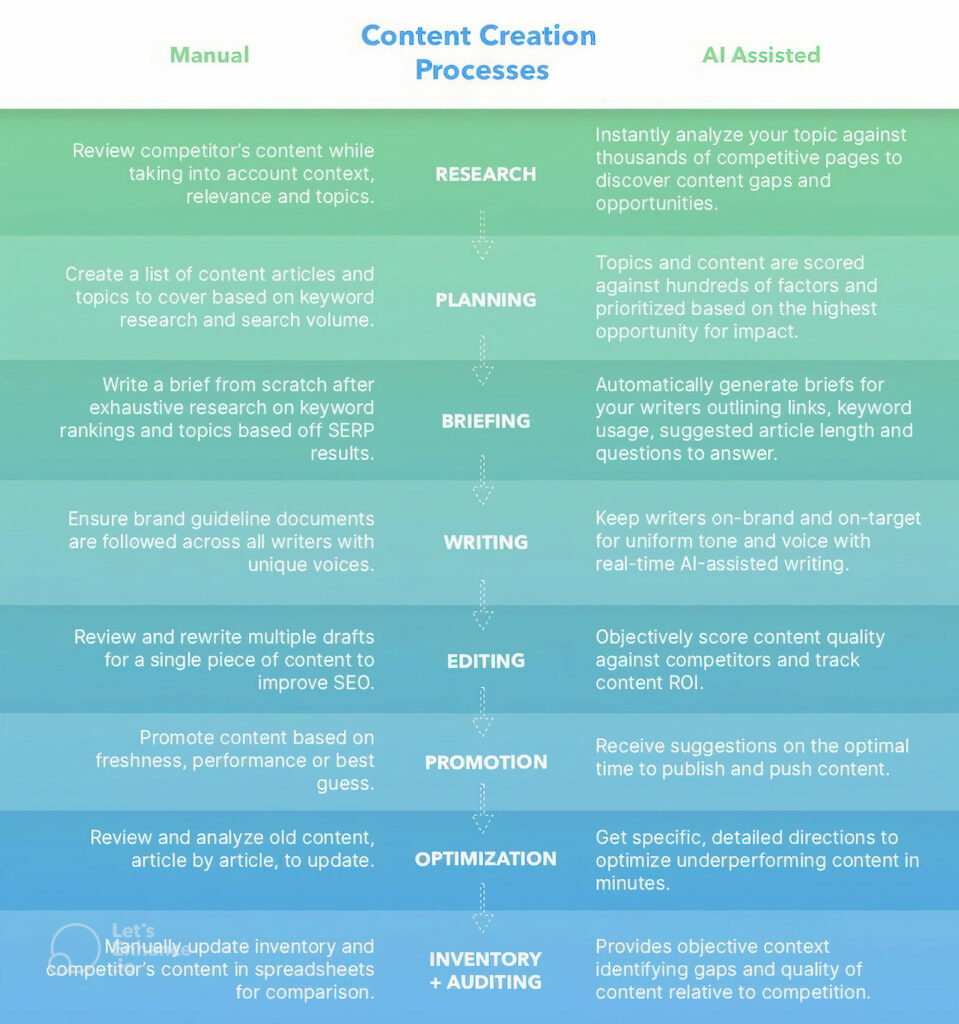The digital revolution spearheaded by artificial intelligence (AI) has permeated numerous industries, from healthcare and finance to entertainment and logistics. Among these sectors, blogging stands out as a domain experiencing a transformative AI-induced shift. Here, we’ll delve into the profound ways AI tools are sculpting the future of blogging, offering bloggers unprecedented capabilities and opportunities. In this guide, you’ll learn how AI-powered tools are shaping the future of blogging and how Artificial Intelligence is changing the way we write blogs.
1. Taking Content Creation to New Heights

AI’s most palpable impact on blogging lies in content creation. Advanced AI models like OpenAI’s GPT and Jasper have demonstrated their prowess in generating content that’s not only coherent but also contextually relevant and engaging. While the essence and authenticity of human writers remain unmatched, these AI-driven tools offer significant assistance by:
- Providing a foundation or draft for initial content ideas
- Suggesting enhancements to refine content structure
- Auto-generating SEO-rich meta descriptions to bolster search rankings
Moreover, the visual aspect of blogging hasn’t been left behind. Solutions like RelayThat and Lumen5 harness AI’s potential to churn out compelling visual content, transforming mere text inputs into vibrant images or even video snippets.
2. Strategizing Content with Precision
Gone are the days when bloggers published content based on gut feeling. Today, sophisticated AI tools like Crayon furnish invaluable insights by dissecting user data, unveiling topics and themes that truly resonate with readers. This data-driven approach ensures more targeted and impactful content.
Additionally, the SEO landscape, known for its intricate complexity, is being demystified by AI. Platforms like Clearscope and MarketMuse are at the forefront, offering actionable content recommendations, pinpointing keyword opportunities, and ensuring each blog post is a beacon for search engines. Learn how AI-powered tools are shaping the future of blogging and how Artificial Intelligence is changing the way we write blogs.
3. Personalizing the Reader’s Journey
The blogosphere today thrives on personalization. Just as streaming platforms suggest movies, AI curates a bespoke reading experience. Platforms like Bibblio employ AI algorithms to discern user preferences and behavior, seamlessly recommending related articles that captivate readers, thereby enhancing on-site engagement.
Furthermore, the real-time interactivity facilitated by AI-driven chatbots such as Drift or MobileMonkey adds a dynamic layer to blogs. These chatbots cater to reader queries, guide them to pertinent content, and foster a sense of community.
4. Amplifying Content Reach: AI-Powered Tools for Blogging
Promoting content has always been a Herculean task for bloggers, but AI is changing the game. Social media management tools, including stalwarts like Buffer and Hootsuite, incorporate predictive algorithms that astutely ascertain peak engagement windows, ensuring each post garners maximum visibility.
On the email marketing frontier, platforms like Mailchimp are breaking new ground. By harnessing AI, they adeptly segment email lists, curate personalized content, and refine delivery timings, leading to skyrocketing open rates. Learn how AI-powered tools are shaping the future of blogging and how Artificial Intelligence is changing the way we write blogs.
5. Translating Data into Insights
In the data-rich realm of blogging, discerning actionable insights is paramount. AI-powered analytical tools such as PaveAI have emerged as game-changers. Instead of bloggers grappling with overwhelming data, these tools distill analytics into clear, actionable strategies for enhancing blog performance.
Spotlight on AI Tools in Action:
- OpenAI’s GPT models: Empowering bloggers with content ideation and foundational drafts.
- RelayThat: A favorite among bloggers needing quick, captivating visual content.
- Clearscope: A boon for SEO professionals aiming to ascend search result rankings.
- Bibblio: A go-to for multi-author blogs keen on presenting a diverse article palette.
- Buffer: The gold standard for strategically timed social media outreach.
6. The Evolution of Reader Engagement
One of the most captivating aspects of AI’s integration into blogging is how it’s reshaping reader engagement. Interaction isn’t just about leaving comments anymore. With AI, blogs can offer:
- Interactive Polls and Quizzes: Tools like Outgrow use AI to create dynamic polls and quizzes that adapt based on user responses, keeping readers engaged and gathering data simultaneously.
- Voice Search Optimization: As smart speakers and voice-activated assistants become ubiquitous, optimizing blogs for voice search is crucial. AI tools analyze voice search queries, enabling bloggers to tweak their content for better accessibility and discoverability.
- Dynamic Content Adjustment: Imagine reading a blog that evolves based on your preferences. With AI, it’s possible. By tracking reading habits, tools can adjust content on-the-fly, ensuring readers always find what they’re interested in.
7. Enhancing Accessibility and Inclusivity: AI-Powered Tools for Blogging
A universally accessible blog is no longer a distant dream, thanks to AI. Features like:
- Real-time Translations: Platforms like DeepL can translate blogs into multiple languages in real time, ensuring content reaches a global audience.
- Text-to-Speech Capabilities: Tools such as ReadSpeaker convert written content into spoken words, making blogs accessible to visually impaired readers or those who prefer auditory consumption.
8. Protecting Content and Maintaining Authenticity
With the rise of digital content, plagiarism and content theft have become rampant. So, AI-driven tools like Copyscape and Grammarly can:
- Detect Plagiarism: These tools scan vast internet databases to ensure content uniqueness.
- Enhance Content Authenticity: By suggesting improvements and identifying cliches, In addition, AI helps in refining content to be more genuine and relatable.
The Bigger Picture: AI’s Ethical Implications in Blogging
While the promises of AI in blogging are many, it’s imperative to tread with caution. Ethical concerns arise:
- Reliability of AI-Generated Content: Firstly, over-reliance on AI for content creation could compromise the personal touch and authenticity that readers cherish.
- Data Privacy: Secondly, as AI tools collect and analyze more user data, concerns about data misuse and privacy breaches become paramount.
However, with responsible use, AI can be a valuable ally. By maintaining a balance between human touch and AI’s efficiency. So, the blogging realm is poised for a revolution, blending the best of both worlds.
AI-Powered Tools for Blogging Concluding Thoughts
AI’s footprint in the blogging ecosystem is expansive and growing. As these AI-driven tools continue to evolve, they promise a future where bloggers can produce richer content, captivate larger audiences, and navigate the digital realm with unparalleled ease. Embracing AI doesn’t signify sidelining human creativity; it’s about amplifying it, shaping a future where man and machine co-create masterpieces.








